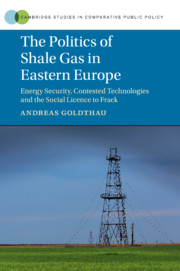Crossref Citations
This Book has been
cited by the following publications. This list is generated based on data provided by Crossref.
Zoll, Maksymilian
2020.
Handbook of Energy Governance in Europe.
p.
1.
Hinterleitner, Markus
2020.
Policy Controversies and Political Blame Games.
Smith, Ida Dokk
2020.
The Palgrave Handbook of Managing Fossil Fuels and Energy Transitions.
p.
427.
Sovacool, Benjamin K
Bergman, Noam
Hopkins, Debbie
Jenkins, Kirsten EH
Hielscher, Sabine
Goldthau, Andreas
and
Brossmann, Brent
2020.
Imagining sustainable energy and mobility transitions: Valence, temporality, and radicalism in 38 visions of a low-carbon future.
Social Studies of Science,
Vol. 50,
Issue. 4,
p.
642.
Goldthau, Andreas
and
Sitter, Nick
2020.
Power, authority and security: the EU’s Russian gas dilemma.
Journal of European Integration,
Vol. 42,
Issue. 1,
p.
111.
Aczel, Miriam R.
2022.
The Palgrave Handbook of Natural Gas and Global Energy Transitions.
p.
21.
Zoll, Maksymilian
2022.
Handbook of Energy Governance in Europe.
p.
923.
Foltyn, Claudia
Keller, Reiner
and
Klaes, Matthias S.
2023.
The Ordering of Green Values.
Nature and Culture,
Vol. 18,
Issue. 1,
p.
88.
Grgić, Gorana
2025.
A shift in (a)symmetry, not gravity: the transformation of Central and Eastern Europe in transatlantic relations.
International Politics,



